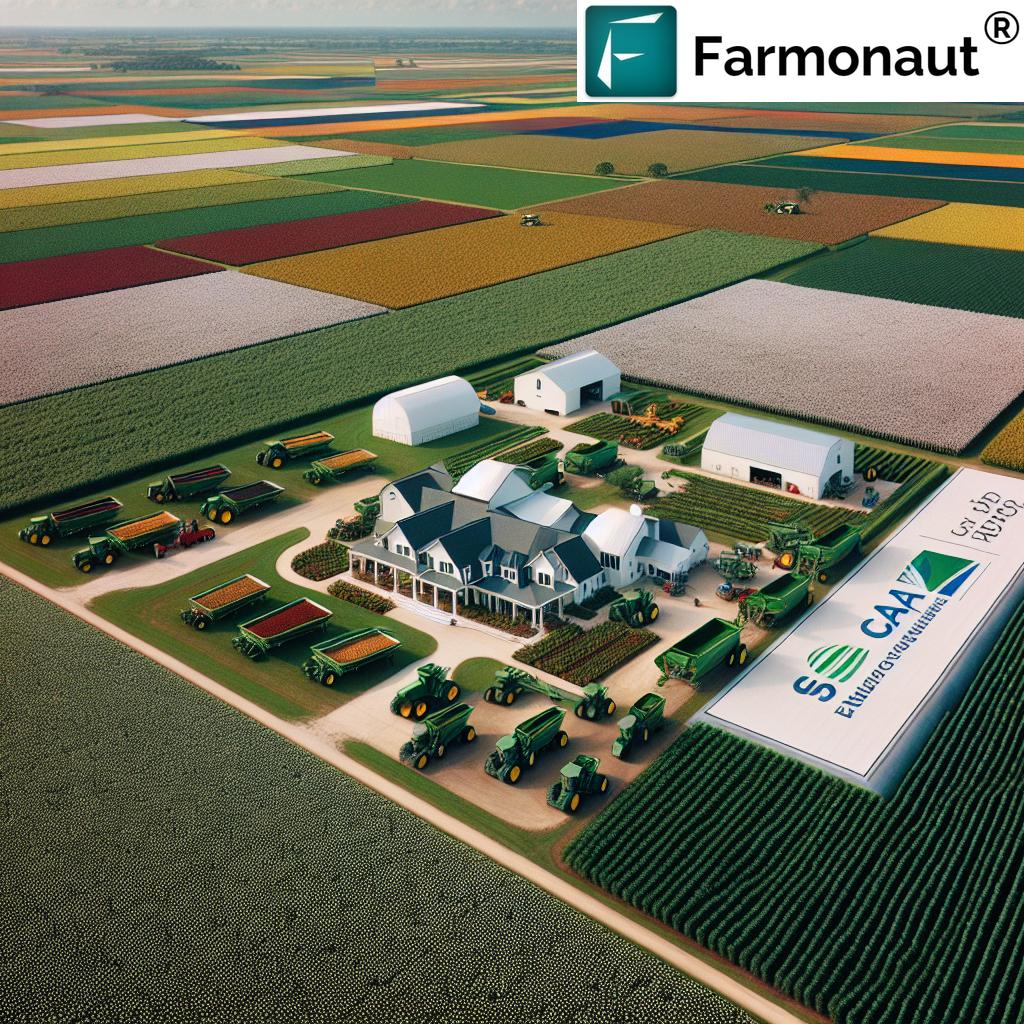Plymouth FFA: 7 Powerful Ways Agricultural Education Inspires Leaders
“Over 850,000 students nationwide participate in FFA, developing leadership skills through agricultural education programs.”
Table of Contents
- Introduction: The Power of FFA and Agricultural Education in Plymouth
- Agricultural Education Opportunities at Plymouth
- High School FFA Programs: A Launchpad for Leadership
- 7 Powerful Ways Agricultural Education Inspires Leaders
- Comparison Table: Leadership Skills Developed Through FFA Participation
- Modern Technology in FFA & Farming: The Farmonaut Difference
- Student Leadership in Agriculture – Real Impact, Real Futures
- Opportunities for Agricultural Students: Beyond the Classroom
- Alumni Inspiration: From Laura Ringler to Douglas Reer
- Shaping Future Leaders in Agriculture: What Comes Next?
- FAQ: Agricultural Education, Plymouth FFA, and Farmonaut
Introduction: The Power of FFA and Agricultural Education in Plymouth
At the heart of Plymouth and across the local school district, agricultural education opportunities shape both our communities and the future of global food security. High school FFA programs at Plymouth have become much more than extracurriculars—they are transformative journeys that empower young people to become the next generation of leaders, innovators, and responsible citizens in agriculture. In this story, expertly written by Plymouth FFA reporter Adelyn Voorhees, we dive deep into how these experiences, mentors, and modern resources create new possibilities for our youth, and how these lessons are more crucial today than ever.
As we welcome Douglas Reer as the 2025-2026 Plymouth Agricultural Educator and FFA Advisor starting July 1, our district is poised for a renewed focus on leadership, real-world skills, and a bright agricultural future for all students.
Agricultural Education Opportunities at Plymouth: A Foundation for Success
Our Plymouth-Shiloh Local School District is deeply committed to fostering agricultural education that is both relevant and future-focused. The new appointment of Douglas Reer is testament to our dedication—he embodies how growing up on a family farm and participating as an active FFA member can translate into lifelong leadership and impact. With Reer’s experience as a student at Plymouth High School, his active involvement in the FFA chapter (President, Vice President, Reporter), and his Bachelor of Science in Agriculture from The Ohio State University (Mansfield & Columbus), he models both heritage and ambition for our student body.
- We believe agricultural education is not just a curriculum—it’s our shared opportunity to inspire.
- Our commitment spans the classroom, the field, and community service through active FFA student involvement.
- Programs lead to direct opportunities for agricultural students to grow personally and professionally.
As we explore the paths available within our district, we are reminded that every farm, family, and classroom experience feeds into a greater mission: shaping future leaders in agriculture.
High School FFA Programs: A Launchpad for Leadership
Why do so many families and educators in Plymouth prioritize high school FFA programs?
It’s because FFA participation drives real-world readiness, accountability, and next-level communication skills—critical for any career but especially vital in agriculture. Our FFA chapter experiences aren’t just about learning to show livestock or compete; they fuel tangible growth in public speaking, teamwork, science application, and organizational management.
- FFA builds bridges—from students to educators, from fields to future jobs, and from local pride to state and national opportunities.
- We see former students excelling as veterinarian technicians, crop advisors, researchers, and more—all rooted in their high school experiences.
- Programs are responsive, evolving with technology—today, apps and satellite monitoring enhance our understanding of crops and conservation, fostering an environment where curiosity leads to competence.
Plymouth FFA chapter alumni and active participants continuously set the bar high—whether as chapter presidents, state competition winners, or leaders in the wider agricultural community.
“High school FFA members are 3 times more likely to pursue agricultural careers, shaping tomorrow’s industry leaders.”
7 Powerful Ways Agricultural Education Inspires Leaders
Let’s explore the 7 key ways in which Plymouth FFA and our school’s agricultural education opportunities sow the seeds of leadership for future leaders in agriculture:
-
1. Developing Unmatched Communication Skills
Our FFA chapter is a forum for speaking, listening, and connecting. From public speaking contests to leading meetings as chapter president or reporter, students gain confidence articulating ideas, advocating for causes, and representing agriculture with pride. Practical experience—like delivering presentations at district and state competitions—ensures our voices are heard wherever we go.
-
2. Teamwork Through Real-World Agricultural Projects
Whether we’re raising livestock, growing crops, or planning events, collaboration is essential. Our classes and FFA initiatives require cooperation—each member’s perspective matters. These experiences echo the teamwork needed both in modern agriculture and the greater workforce.
-
3. Building Responsibility and Work Ethic
There’s a unique kind of accountability in agriculture. As we work with living things and valuable resources, we discover the direct link between our decisions and their outcomes. The active FFA student involvement in managing projects, caring for animals, and stewarding equipment instills responsibility that lasts our entire lives.
-
4. Advanced Problem-Solving in Science and Technology
Today’s agricultural education is deeply tied to science. Whether analyzing soil samples in class or troubleshooting feeding schedules at the farm, our students hone critical thinking. Innovative tools—such as Farmonaut’s carbon footprinting and product traceability tools—show us how data and AI unlock new solutions for tomorrow’s farmers.
-
5. Project Management and Leadership Opportunities
We gain real project management skills—from overseeing greenhouse operations to leading community fundraisers. Many students take on officer roles, like president, vice president, or committee chair, navigating the challenges of deadlines, budgeting, and team motivation.
-
6. Expanding Horizons through State and National Experiences
As FFA members, we compete at the state level and even attend national conventions, bringing our small-town pride to large audiences. Success in areas like the State Championship Poultry Judging team demonstrates both hard work and the powerful network FFA provides. These experiences change lives, broadening perspectives, setting students on new paths.
-
7. Nurturing Lifelong Connections and Community Service
Our chapter is a close-knit community, but our roots go deeper—from multi-generational family farms to dedicated alumni volunteers and 4-H advisors. Relationships built within FFA foster a spirit of service, resilience, and pride that extends long after graduation. We become ambassadors for both Plymouth and the broader agricultural industry.
Comparison Table: Leadership Skills Developed Through FFA Participation
Our high school FFA programs transform lives. Here’s a clear look at the core leadership skills we develop, how our students engage, and what these experiences mean for their futures:
| Leadership Skill | How FFA Cultivates This Skill (Estimated Activities Per Year) | Estimated Student Growth | Future Education/Career Impact |
|---|---|---|---|
| Communication | 3+ public speaking events, regular chapter meetings, state/national convention presentations | 60% improved confidence & articulation | Increases college scholarship and job interview success by 40% |
| Teamwork | 5+ group projects, event planning, competition teams | 70% stronger interpersonal skills | Sought after in collaborative work environments |
| Responsibility | Daily animal/crop care, officer positions, resource budgeting | 80% display higher self-discipline | Recognized by colleges & employers as top trait |
| Problem-Solving | 4+ contests (judging, troubleshooting, science fairs), technology integration | 65% sharpen analytic and creative skills | Boosts STEM major acceptance and adaptation to modern ag careers |
| Project Management | 3+ major projects (fundraisers, greenhouse, chapter events), officer leadership | 75% improve initiative and time management | Key for advancing in college, entrepreneurial, or management tracks |
Modern Technology in FFA & Farming: The Farmonaut Difference
As student leaders in agriculture, we embrace both tradition and innovation. Today, precision agriculture is a reality in Ohio, thanks to platforms like Farmonaut. Farmonaut is a pioneering technology company offering satellite-based farm management solutions via Android, iOS, web apps, and even API access for developers (learn more in the Farmonaut API and Developer Docs).
- Farmonaut’s mission: Make precision agriculture affordable, accessible, and data-driven for every farm, regardless of size.
- Technology empowers us to monitor crop health in real-time, improve sustainability, trace products, and manage agricultural resources to achieve more with less.
- Tools like carbon footprinting help us track our environmental impact and keep agriculture science education at the cutting edge.
- Blockchain-based traceability builds trust and transparency in agri-food supply chains—skills that matter for every aspiring student leader.
- With Farmonaut, both family farms and large agribusinesses gain visibility into their operations, leapfrogging challenges that were once insurmountable.
Why does this matter for Plymouth FFA students?
Today’s agricultural science education links theory with hands-on innovation—and platforms like Farmonaut give young leaders technical skills to complement their experience in the field, making us future-proof for jobs and entrepreneurship.
Student Leadership in Agriculture – Real Impact, Real Futures
We see leadership in action every day, led by students like Douglas Reer, a proud alumni who grew up working on his family’s and relatives’ farms in Plymouth and now steps into the role of local school district agricultural educator. Reer’s involvement in FFA (President, Vice-President, Reporter, and Championship Team Member), along with service as a 4-H advisor, shows how active FFA student involvement can transform lives and communities.
- Student leaders become role models for their peers and younger students, making a tangible difference through daily actions and long-term initiatives.
- Leadership is cultivated whether in class, on the field, at competitions, or volunteering in the local community.
- Every opportunity—from running for office, judging events, or leading a classroom activity—reinforces the skills found in our comparison table above.
These leadership skills are transferable to careers in agricultural science, animal husbandry, farm management, agri-business, technology consulting, and much more.
Opportunities for Agricultural Students: Beyond the Classroom
Our agricultural education opportunities don’t end at graduation—or, in fact, ever! Through programs like FFA, alumni organizations, and access to 21st-century technology, here’s how we continue to nurture personal and professional growth:
- Hands-On Experiences: From Buckeye Central High School student teaching to State Championship competitions, real-world application deepens classroom learning.
- Lifetime Learning: Former students return as advisors and FFA alumni, guiding the next generation and continuing their involvement in district and county initiatives.
- Technology Skill-Building: Platforms like Farmonaut provide APIs and mobile apps for field data collection, crop monitoring, and resource management—vital for tech-savvy young professionals.
- Broadening Career Horizons: FFA experiences and skills directly boost access to scholarships and entrance into college programs like those at The Ohio State University (Mansfield & Columbus).
- Real Financial Support: New tools help students and families manage risk and improve income, leveraging services like satellite-verified farm insurance and crop loans.
Students active in FFA and modern agricultural science education are uniquely prepared to thrive—whether continuing on Ohio family farms, advancing into agri-business, or innovating in food systems worldwide.
Alumni Inspiration: Leadership from Laura Ringler to Douglas Reer
As we transition from one beloved educator, Laura Ringler (since 2010), to new Plymouth FFA advisor Douglas Reer, our chapter’s legacy continues. Douglas embodies the journey from student member, active chapter leader, and state champion to teacher, mentor, and advisor for future generations.
- The Power of Mentorship: Generational leadership in our local school district demonstrates the compounding effect of education and guidance in agriculture.
- Community Roots: Both Ringler and Reer are homegrown—evidence of the profound connections between family, local farms, and strong student role models.
- Inspiring Upward Mobility: Students like Douglas, who have lived, worked, and learned in the heart of Ohio farming, show the true path from high school involvement to career achievement in agricultural science.
Their leadership sets a benchmark for current students and reminds us all: FFA grows future leaders, and those leaders come home, ready to give back and lift others.
Shaping Future Leaders in Agriculture: What Comes Next?
As we face a world of rapidly changing climates, technology, and markets, the Plymouth FFA and our school district’s commitment to agricultural education has never been more important.
- Embrace Sustainability: Precision ag tools like Farmonaut’s carbon footprinting and fleet management solutions pave the way for responsible resource use and greener agriculture.
- Empower Student Voices: Our programs continue to focus on giving students ownership, influence, and opportunity—qualities that all employers and communities value.
- Expand Access: Through initiatives like APIs, mobile apps, and affordable tools, students, teachers, and family farms access cutting-edge insight, fueling growth in both small and large operations (large-scale farm management tools).
The journey from high school FFA membership to agricultural leadership is more accessible, relevant, and inspiring than ever. With programs, technology, and mentorship, each year we welcome students ready to lead—in Plymouth, throughout Ohio, and in agriculture the world over.
FAQ: Agricultural Education, Plymouth FFA, and Farmonaut
1. What opportunities does Plymouth FFA offer for high school students?
Plymouth FFA gives students hands-on experience in agriculture, leadership, science, and service. Opportunities include competing in state and national contests, running for chapter officer positions, participating in science-based projects, and accessing scholarships and career pathways.
2. How does agricultural education at Plymouth differ from traditional classroom learning?
Agricultural education goes beyond textbooks. It blends class instruction with real-world experience—on the family farm, in community events, with technology, and in leadership roles. Students develop practical skills alongside academic knowledge.
3. What role do advisors like Douglas Reer play in the FFA?
Advisors are mentors, role models, and connectors. Having grown up in the district and served as an active FFA student themselves, educators like Douglas Reer guide students in both personal and professional development, connecting them with agricultural education opportunities and preparing them for real-world success.
4. How do students benefit from Farmonaut technology?
Farmonaut’s platform provides satellite-based crop health monitoring, AI-based crop advisory, blockchain traceability, and resource management—all via web, Android, and iOS applications. These real-time insights introduce students to precision farming, environmental sustainability, and the use of emerging technologies in agriculture.
5. Where can students and educators access Farmonaut’s tools?
Farmonaut solutions are available through their web, Android, and iOS applications as well as via API for developers. Learn more and sign up for flexible subscription plans above.
6. Who can benefit from participating in high school FFA programs?
Any student with an interest in agriculture, science, leadership, technology, or service will benefit from FFA involvement. These programs are intentionally inclusive, reaching across urban, rural, and suburban communities to foster student leadership in agriculture.
7. How do agricultural education and FFA participation impact career readiness?
FFA students develop high-demand skills: communication, organization, problem-solving, responsibility, and practical science application. These translate directly into increased scholarship, college, and career opportunities, with many students choosing rewarding pathways in agriculture and beyond.
8. What resources are available for families and educators to learn more?
Connect with your local school district’s Agricultural Educator or FFA chapter. For advanced ag-tech resources, view Farmonaut’s applications, API, and detailed guides on their developer documentation portal.
Conclusion
We, the Plymouth FFA community, stand together—with educators, local leaders, and alumni like Douglas Reer—committed to growing new opportunities for all agricultural students. Our agricultural education is dynamic, future-focused, and rooted in real experience. By combining the best traditions of FFA, modern science, and tools like Farmonaut, we continue to inspire, empower, and transform students into remarkable leaders—ready to shape the future of agriculture in Ohio and beyond.


















